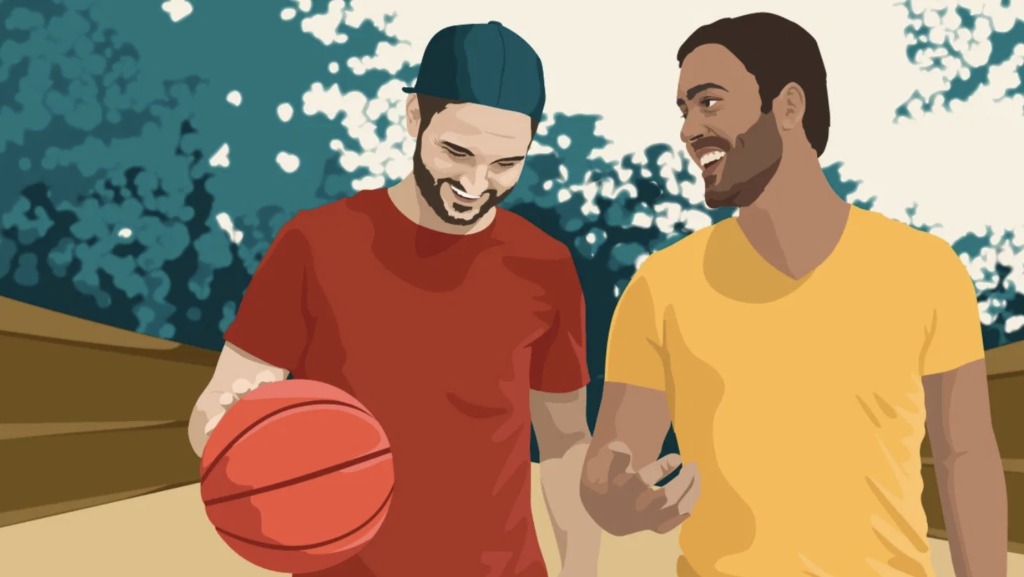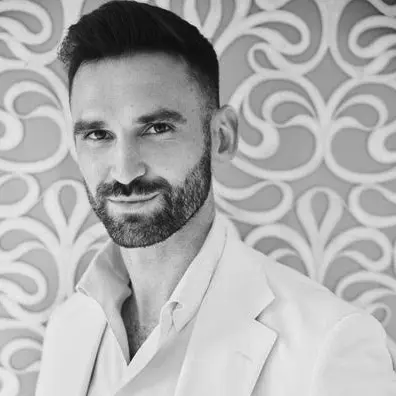“I need help.”
“I can’t do it on my own.”
“I don’t know how to handle this.”
When you read those words, did you feel a little bit of a cringe, or a pang of inadequacy?
That’s common for too many men — the concept that asking for help or needing support or showing your feelings is weakness.
Male vulnerability is depicted negatively in much of pop culture, with the ideal man being either “strong, silent type,” a cocky and confident rogue, or a guy who only expresses emotion in the form of rage.
There’s no room in those retellings for men who show their feelings, who ask for help or connection, who are honest about their needs with their partners, family or friends.
How, then, are men supposed to build meaningful connections or to create true partnerships?

1. Stop judging yourself.
Male vulnerability is seen too often as weakness or laziness. Men are taught that if you’re just smart enough, if you just work hard enough, you’ll power through and find a solution to your problems all on your own.
If you haven’t succeeded, or if you express a need, it’s just because you didn’t try or because you’re not enough.
Here’s the thing though: None of us are enough.
Being vulnerable means being brave enough to share your emotions and to express emotions on a wider range — to share when you’re feeling afraid or uncertain or unhappy, to share your hopes, dreams, fears and goals, even when they fall outside the traditional, narrow spectrum deemed acceptable to “manly” men.
2. Let go of defensiveness.
Defensiveness is one of the tools we’re most accustomed to reaching for when we’re confronted with something we can’t handle.
When you’re trying to be open and vulnerable, you may find yourself sinking back into a defensive position after your conversational partner speaks. It’s important that you feel open to ambiguity and to not always being right in your quest to display more vulnerability.
The best thing you can do is to relax. Let go of the tension and preconceived notions that underlie your conversation.
Being secure in who you are is critical to being able to relax in the conversation. It creates a virtuous cycle.
When you know who you are, you’ll feel more comfortable being vulnerable. When you’re more comfortable being vulnerable, you can better express who you are to your friends, family or partner. And the more you are vulnerable with them, the more they’ll feel open to expressing themselves to you.
If you feel defensiveness rearing its head during a conversation, take a break, or take a moment to express it. Tell your conversational partner that you’re feeling a little defensive and clarify what they meant by different comments. That clarity and active listening can go a long way toward creating a better atmosphere for your conversations.
3. Find the root cause.
Consider writing in a journal and analyzing your feelings. Just taking a few minutes to record your day can help you to sort through emotions and determine the real driving emotion behind your actions/reactions.
It can be a relief to get those feelings out in the open, whether you write them down or speak them out loud. The goal here is to give true consideration to your feelings and. Once you’ve given some thought to what you’re feeling, you’ll be able to move forward and understand what’s driving those thoughts and how you can best express them to the people in your life.
4. Open up in a safe format.
You express your vulnerability by opening up, by telling yourself you can’t do it alone and by sharing your story.
Many people might suggest opening up to your partner, but you also might feel afraid of what they’ll say and how they’ll react. Nothing hurts more than trying to express your feelings to the person you love and being brushed off, dismissed or ridiculed.
When you’re trying to become more comfortable with expressing vulnerability, it can also make sense to do so in a different setting. Consider connecting with a group of men who are also charting this same course, also trying to make male vulnerability a natural form of expression for them.
When you connect with other men, you can hear what’s worked for them, can encourage each other and can build the true confidence (not the stereotypical bravado) you need to disclose your true feelings, express your needs and show vulnerability. Meet with men who are seeking the same deepened emotional experience you are, and make those connections.
When you’re ready and once you’ve been equipped with the tools you need for success, you can start opening up to the other important people in your life – your family, your partner.
Allowing yourself to be vulnerable as a man is hard work. It requires strength of mind and character to break through the harmful stereotypes you’ve been inundated with.
Think about the first time you went to a gym or went for a run. You weren’t perfect then, and it took time to develop and strengthen those physical muscles. If you feel like it’s an uphill battle, you’re not alone, and there are plenty of men in your circle and your community facing the same challenge.
Just like getting physically fit, vulnerability requires an additional level of mental and emotional conditioning. Flexing those emotional muscles takes effort, but it’s worth it, and you’ll be astounded by the deeper level of connection and emotion you’re able to tap into, and the stronger relationships you build, as you work toward demonstrating male vulnerability.
male vulnerabilityvulnerability




Leave a Reply